Two jobs, two countries, two homes
by Hinke Osinga,
University of Bristol, UK
Yulij S. Il'yashenko considers himself very
lucky. From January to August each year he has a great job as
Professor at Moscow State University and President of the
Independent
University of Moscow in his beloved homeland Russia. Yulij spends
two weeks of summer with his students at an outdoor summer camp, where
he or his older students give lectures, mathematical problems are
discussed intensively, and a program is drafted to help the students
maintain the seminar on their own in the Fall semester. During the
Fall semester, namely, Yulij lives in Ithaca and works at Cornell
University. Since the iron curtain came down, it has been very
difficult to hold an academic position in Russia. "If a Russian wants
to be a mathematician he has three options: 1) get a position in
the west; 2) starvation (more precisely, shortage in everything);
or 3) lead a life of regular visits to the west to supplement the
meagre salary." Clearly, Yulij has chosen option 3 rather than to quit as
a mathematician. However, he views this life split between two
countries as an opportunity; having been going back and forth for 12
years now, he feels at home both in the Russian and the American
cultures. "In fact, I now have three homes! Helen and I just built a
winter country house by a beautiful reservoir in Russia."
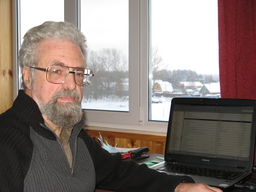 |
|
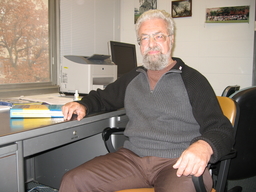 |
|
Yulij
Il'yashenko in his winter country house in Russia,
January 2009.
|
|
Yulij
Il'yashenko at Cornell University, November 2008.
|
A Mathematics career under the communist regime
Mathematics was Yulij's favorite subject in
High School. He was taught by I.V. Morozkin who was famous in Moscow
for his inspirational mathematics teaching. In fact,
V.I. Arnol'd had been in his class only six years earlier
and Morozkin clearly felt he had been his best student. "Morozkin told
us about Arnol'd many times. Arnol'd himself recalls how at
age 11 he had worked on a mathematical problem that Morozkin had
presented. Solving it had given him such delight that the experience
stayed with him for the rest of his life." Yulij had this exact same
experience. "When I was 11 Morozkin gave us a problem in the form of a
poem. It was about flowers and bees visiting one flower after
another. You needed fractions to solve this problem, but Morozkin had
not said anything about that and we hadn't had fractions yet!" When
Yulij did solve the problem he felt the same elation Arnol'd had
experienced six years earlier.
Moscow State University (MSU) organized annual
Olympiads in Mathematics, and Yulij won in 1957. "There were also
mathematical circles for children at MSU. These were like small
problem solving clubs where mathematics was taught by students who
were about three years older than the participants. Arnol'd was
teaching there when he was a freshman. I joined a circle taught by
Boris Yefimov and Pavel Medvedev, who in turn had been taught by
Arnol'd three years earlier." Yulij very much enjoyed going to
these meetings and it shaped his mathematical career. As the winner of
an Olympiad Yulij had no trouble getting accepted to MSU and he was
also allowed to stay on to study for a postgraduate degree. "Despite
the communist regime, the mathematics department at MSU was florishing
at that time, largely thanks to the gracious efforts of its President
I.G. Petrovski and supported by some great mathematicians like
A.N. Kolmogorov."
As a child Yulij believed his school teachers who
told the students that their country was the most just country in the
world. "Then one day in 1956, as I was playing outside in the
courtyard, another boy challenged me and said: `Do you know that
Stalin was a rascal and killed 200 people?' I ran home to ask my
father whether this was true." Yulij's parents were not supporters of
the communist regime. In fact, some of their friends were in
jail. Yulij's father told him about the Stalinist regime, the camps
and the killings. Yulij felt deceived and disillusioned.
|
During his
graduate studies Yulij recalls that books of Aleksandr Solzhenitsyn
were circulating among the students. "These were typed copies that you
had to read quickly and then pass on." Yulij read some of these copies
and highly appreciated them. Unfortunately, if you wished to obtain a
position as Assistant Professor at MSU, you should openly favor the
communist regime. "Appointment decisions were taken by a Party
Committee. Since I had not done anything to please them, it was
obvious they would never offer me a position." However, at that time
I.G. Petrovskii was President of MSU. "Petrovskii was an
absolutely great person. Mathematically, he may well be compared with
Kolmogorov, but probably his main achievements were on the
administrative, better to say, on the humanistic side. He was strongly
resisting the system. While the system broke down people, he would
help them and support them as often as he could."
|
|
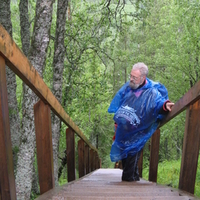 |
| Yulij on the staircase of
Mountain Sekiranya that is described by Solzhenitsyn in "The Gulag
Archipelago". |
Yulij recalls the story of student I.S. who had been
in a camp for five years, and who came back to Moscow after he was
freed. "He tried to return as a student to MSU and addressed various
Vice-Presidents. However, he was sent from one to the other, and no
one was willing to take a decision. At last he met with Petrovskii, who
merely asked him: `How did you get out of prison, was it amnesty
or rehabilition?' Amnesty would mean that his crimes had been
forgiven, but rehabilition meant that he had never been guilty in the
first place. When I.S. answered: `Rehabilitation', Petrovskii
accepted him without any further paperwork." Yulij learned about this
story when he met I.S. almost 40 years later in Paris, where I.S. was a
priest in an orthodox church. "Petrovskii always had cunning ideas to
bypass the Party Committee. As President he had the power to stop the
postgraduate studies of a student and accept him/her for a position at
MSU; such an abrupt stop meant that one did not have to go through the
usual procedures." Yulij was hired as Assistant Professor in 1968 and
obtained his PhD only a year later in 1969. Indeed, he remembers
several other talented young people who got hired at MSU in this
way.
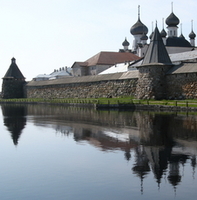 |
|
As a
young Assistant Professor, the restrictions of the communist regime
began to become a serious burden. "I was in a category of so-called
non-quit people. This meant that I could never travel to a foreign
country." Yulij was convinced that the communist regime would never
fail. "How could it end? I could only think of two possible ways,
namely, like the Nazi regime ended, or like the tsarist regime ended,
and I did not like either one of these endings." When Gorbachov gave
freedom to Sakharov, Yulij understood that he might dare believe
things would change.
|
| The Solovetski
monastery. |
Permission to travel west
The intellectual interaction between communist and
capitalist countries was, in fact, always rather active and
fruitful. "Lectures in the 1960s included modern western
mathematics. Arnol'd, Yu.I. Manin, Ya.G. Sinai,
S.P. Novikov, A.A. Kirillov, and D.V. Anosov were the
superstars of the young generation and at the forefront of creating new
mathematics. They studied and taught us a lot the achievements by
J.W. Milnor, A. Grothendieck, A. Haeffliger,
Harish-Chandra, S. Smale and others. While this interaction was
not personal, it certainly was very intense."
With the change of the political climate, the
tsarist principle of `to hold and not to let through' seemed to
disappear. "I got the feeling that times were indeed changing. I
started to receive invitations for visits and conferences in the
west. Thus far, the university administration had always ignored my
question whether the doors were already open. However, when I asked
again in 1989 to go to a meeting in Luminy (near Marseille) in France, I
was told that there was a high probability that I could go... And, yes, I
could go!!"
|
Yulij
remembers the excitement about his first visit to the west very
well. For years he had corresponded with western mathematicians
through letters and now, finally, he would meet them in person for the
first time! "I arrived in Luminy around 8:30 pm; everybody was still
in the dining hall, but dinner had already finished. When I entered, I
asked: `How far is the Mediterranian Sea?' Since it was not
too far away, I suggested we go there. It was a romantic night, with a
brilliant sky and the moon was shining over the sea. It was very
impressive. We went swimming and that is how I first met Freddy
Dumortier [Ed: see
Freddy's
interview in DSWeb Magazine] and Jean-Pierre Remis under the
shining stars."
|
|
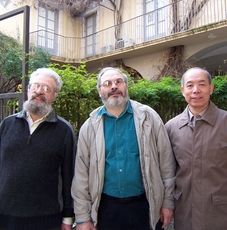 |
| Yulij, Jaume Llibre and Chendzi Li in Spain, 2006. |
And this was only the beginning. Yulij began to
make frequent short visits to the west to strengthen his many
collaborations through personal contacts, rather than the occasional
letters that used to be the only option. In those days, such short
visits provided substantial support in comparison with incomes in
Russia. Through the efforts of Bob Connelly, who was the Head of the
Department of Mathematics at Cornell, Yulij received an invitation in
1997 to a position for one semester per year at Cornell University.
He had visited Cornell the year before in spring, and gladly accepted
the opportunity. He started with a five-year contract, which was
renewed for another five years. Currently he is on a ten-year
contract, which allows him to maintain his ingenious arrangement of
having two part-time positions in Russia and the USA.
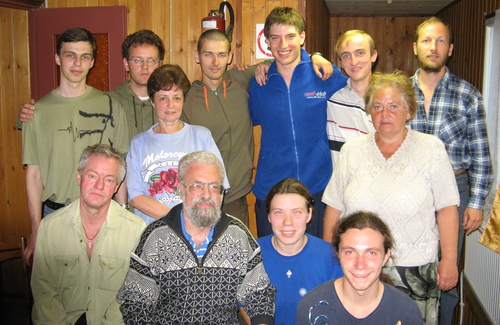 |
| Yulij with his wife Helen
(standing on the right), his students and relatives at the 10th Summer
School held in Solovki, 2007. |
"Even at age 12 I was dreaming about visiting the
cultural capitals of the west, but never about leaving my country. I
hated the communist state, but I am in love with my country." By now,
Yulij feels he is an insider in both countries. "It is easy to switch.
I am expected when I come." The only real difficulty is to support his
seminar at MSU. Started by E. Landis (Yulij's PhD advisor) and
N.N. Nekhoroshev in 1972, this seminar has been going for 36
years. Both Landis and Nekhoroshev have since passed away, and Yulij
is following in their footsteps. In 1998 he invented the perfect tool
to keep the seminar running through his annual five-month absence by
taking his students camping for two weeks. This time of very intense
communication is enough to let the seminar continue while Yulij is at
Cornell University.
The Independent University of Moscow
The years 1968 to 1988 were a period of strong
discrimination against Jews and talented people in general in Russian
science and education. This was reflected in hiring policies and could
obviously be seen at entrance exams at the levels of undergraduate and
postgraduate admissions to MSU. "It meant that a number of students of
Arnol'd, Manin and other great teachers did not get the
opportunities they clearly deserved. For this reason, several of the
more senior academics discussed the possibility of starting a new
university." In 1991 twelve founders,
including Arnol'd, L.D Faddeev, Novikov, Sinai and others,
gave 100 dollars each to start the Independent University. Initially,
there was no building and the university was more like a club; they
convened in the evening hours in some cultural society building. Later
on, High School 2, which is famous in Moscow for teachers such as
I.M. Gelfand and E.B. Dynkyn, allowed them to use their
classrooms in the evenings. In the end, Alexander Musykantski, who was
the prefect of the Moscow central district, convinced Moscow's mayor
Yu.M. Luzkhov to provide a building for the Independent University.
Unfortunately, the city does not have the power to govern a
university, and in order to get around this problem the
Moscow Center for
Continuous Mathematics Education was founded on the principle of
providing high-school education. The Independent University was
invited to teach there.
| |
| |
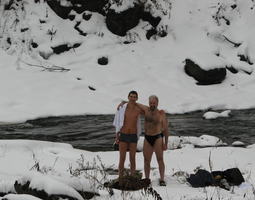 |
|
Yulij
Il'yashenko is President of the Independent University and
responsible for its administration. "I like very much the spirit of
Cornell University with its principle of an open door, open heart and
open mind. I am happy to see this same spirit at the Independent
University." On behalf of the Independent University Yulij took part
in launching the Math in Moscow program, with AMS support from
NSF and analogous support from Canada. Math in Moscow is a
study-abroad program for US and Canadian students to spend one
semester at the Independent University in Moscow. The initiative
started at Cornell University whose foreign exchange office provided
enormous moral support and sent its first student, Alex Smith, off to
Moscow in 2001.
|
| Swimming with Alexey Fishkin in
Ithaca, 2008. |
"I still have the feeling that my generation got a
tremendous historical gift that we never expected. The present
situation in Russia is by far the best in its history, despite all its
shortcomings; people now have the opportunity to work towards
individual goals and to achieve them according to their own
capabilities; they can serve their country without asking for
permission — this is something that had not been possible for a
1000 years!"